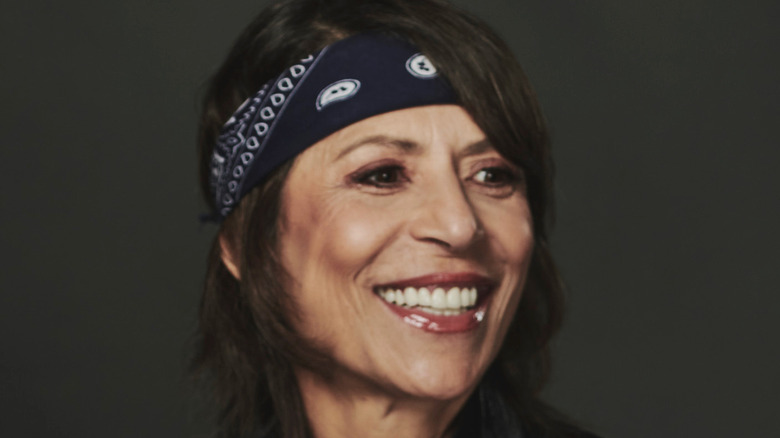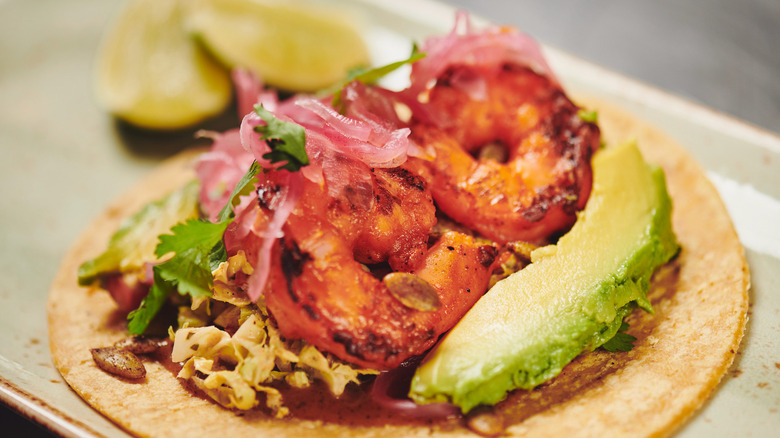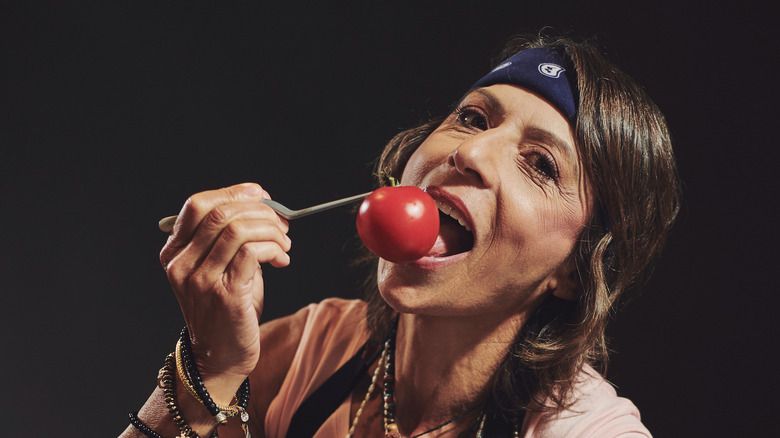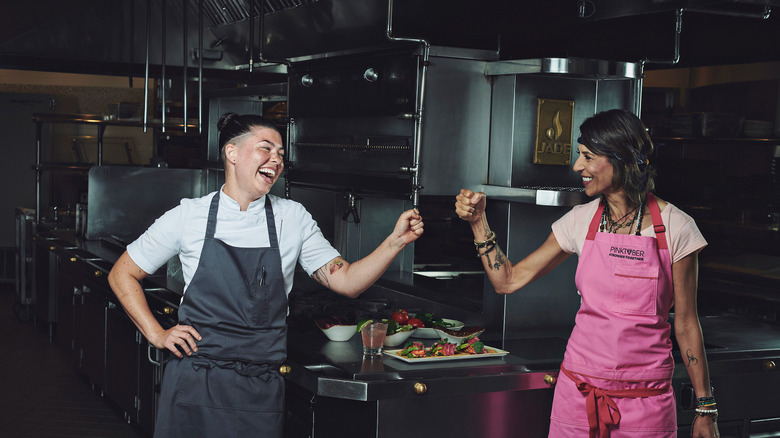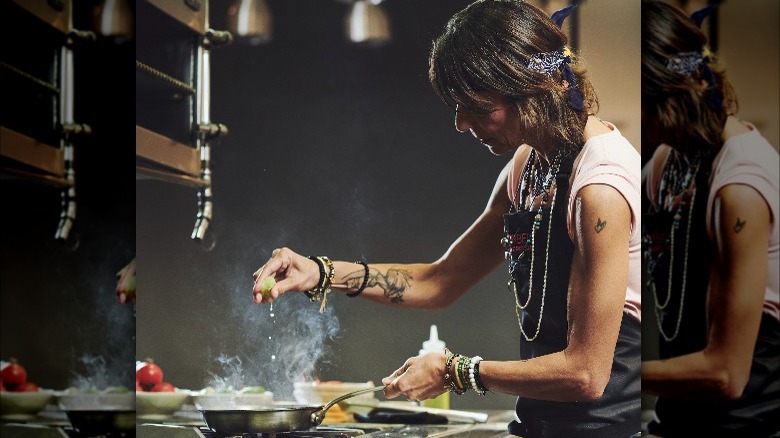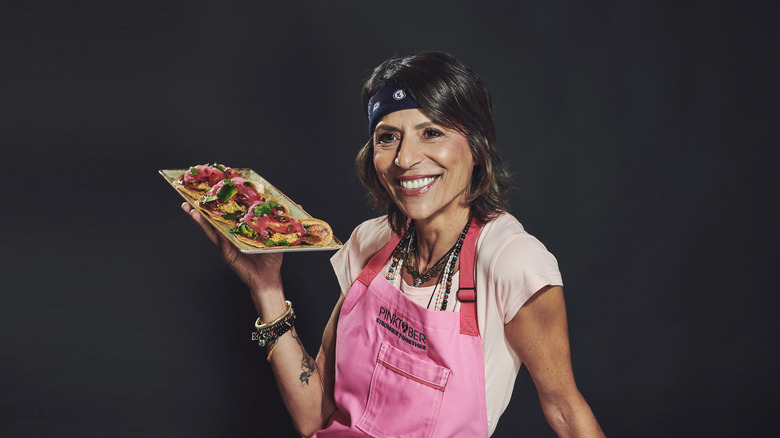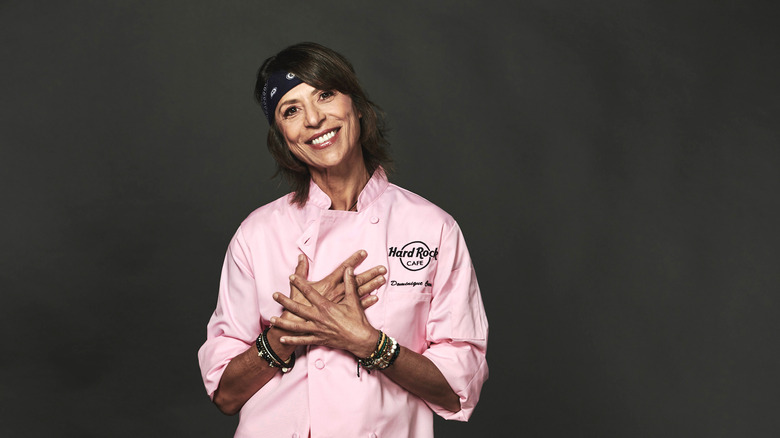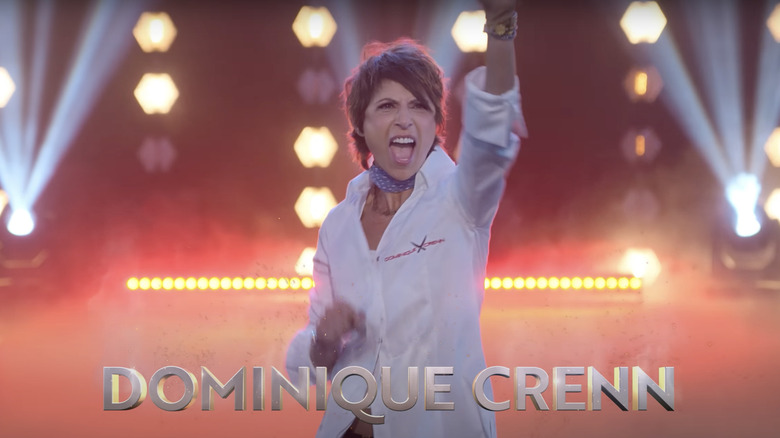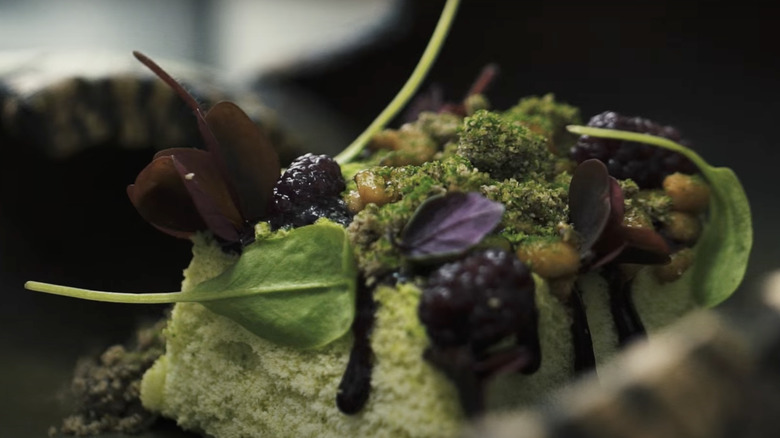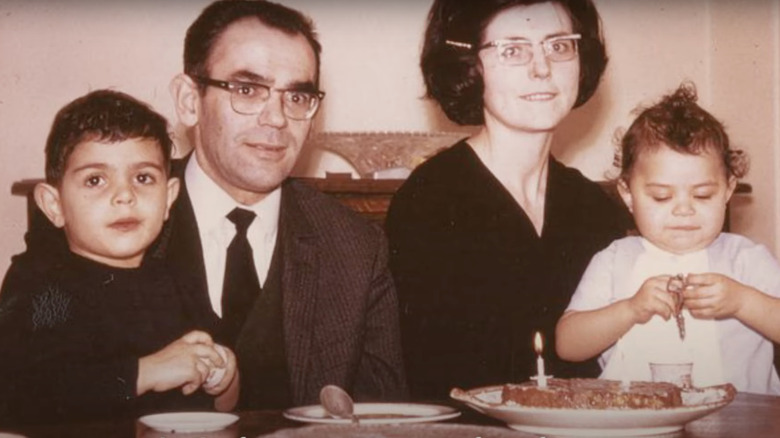Dominique Crenn On Creating Art In The Kitchen For Cancer Awareness - Exclusive Interview
Dominique Crenn is a unique force in the food world. Although she never went to culinary school, she emigrated from France to San Francisco to work at some of the city's best restaurants, including Jeremiah Tower's legendary Stars (via TEDx San Francisco). After a stint cooking in Indonesia, Crenn returned to San Francisco, where she earned a Michelin star while working as the chef de cuisine at Luce. After that success, she struck out on her own, opening her passion project restaurant, Atelier Crenn. The poetic, whimsical food at that restaurant garnered her two (eventually three) Michelin stars, making her the first female chef in America to receive multiple Michelin stars, per Fine Dining Lovers.
In addition to her culinary success, Chef Crenn has also used her platform to speak out about issues she cares about. As a breast cancer survivor, she cares passionately about breast cancer awareness. Crenn spoke with Mashed about her partnership with Hard Rock International for Pinktober, an effort that will raise money for breast cancer research. The chef also talked with us about her passion for activism, her artistic approach to food, and how she got through her own breast cancer treatment.
Pinktober and advice for coping with breast cancer
You chose Baja Shrimp Tacos as your Pinktober menu collaboration with the Hard Rock Cafe. What inspired that?
The first thing is that I needed to celebrate the time and place where I am in California, and celebrate the beautiful legacy of what the Mexican heritage gave to California. Because we all know that California used to belong to Mexico. It's also about the way of life and bringing sunshine to the plate.
Pinktober is a breast cancer fundraiser, and you had your own journey with that. Do you have any advice for people who are dealing with a breast cancer diagnosis?
Yes. Thank you for the question. In 2019, I was told that I had cancer, and it was a triple-negative breast cancer, which is quite a difficult cancer to go through. The reason why I became vocal about it is that about one out of eight women in the United States will have breast cancer, I believe. It was important to be vocal about it, that cancer should not be looked at as something shameful, but as something that we can deal with. It's all about getting information, making sure to keep your head together and not being afraid to have your family and your loved ones around you — and to have as much support as you can, because it's not an easy journey.
Hopefully today, I'm cancer-free, but it is going to be my life journey to make sure that every six months I get a checkup. I try not to look at it as a disease, but look at it as, "Hey, it's happening to me, what can I do to make sure that I can go through it without feeling bad about it?" What I say to people out there is surround yourself with love, support, and great information, and make sure that you have a great doctor that can walk you through it, and eat good food too. Food is medicine, so it's also part of it.
Why food and health are inseparable
What role did food play in your recovery?
It's so funny because I feel that I've always eaten very healthily throughout my life, but now, I focus more on understanding where food is coming from. I eat a lot of plant-based food; I use a lot of my food from the farm. I understand the beauty of the food that I'm eating that is good for my system.
It's all about researching, also — mushrooms are amazing; a lot of greens are amazing. Everybody's different because we're all different. We have different energies, but you can adapt what you eat and your diet. That can make a lot of difference in your food.
I took out all processed food from my diet, which I didn't eat a lot anyway, but it's all out now. It's so nice to eat only amazing food and know who makes it and where it comes from. The mindset that needs to come back into the American diet and into the world diet is that we need to understand what we are eating. If we don't understand that, then, of course, we're going to be sick. That's the way I look at things.
Do you think the American food industry does a bad job at promoting health?
Honestly, yes. When you think about the story of food, in the 1950s, industrialization of food took over the food system and food become a convenience. Instead of being a medicine, it became something that has been created that you put in your body to feed yourself. I understand the convenience part of it, but we need to rethink where food comes from and how it's been produced.
During COVID, we realized that food — the way that we've been eating in America — is a big part of why people are getting sick. Let these thoughts sink inside of your mind and say, "Wow, food is important; let's pay attention to that." It's interesting because I'm in Washington, D.C., today, and there is this big conference about food and hunger and how we can feed the world and feed the kids, and how we can create a system that is much more healthy. It's a conversation that is incredibly important, actually.
The thing that got her through her recovery
What surprised you most during the course of your cancer treatment?
You are faced with your own self, and you have to literally reconnect to who you are as a human and your body. That was very important to me, and it was a wake-up call not just for myself, but also for my two girls that were at the time 6 years old. I had to understand that I'm not invincible. We have to reconnect ourselves with who we are and also with nature and the way we feed ourselves. That was definitely something that was very, very, very important in my life.
Would you say that family and your loved ones got you through the toughest times?
Love, yes. Love is probably the best medicine in anything that you do or anything you go through. But you also have to do your work. Definitely, love is important. Food is love too, so eat food that comes from love, not from a machine.
Is that how you're approaching your menu for the Pinktober dinner?
Yes. We want to make sure that everything that we are going to serve out there is sourced from amazing farmers or fishermen. We want to do everything from scratch and understand that every piece of that menu is being produced by people that love their job and love what they do. It's a celebration of the food world, but also celebrating farmers and fishermen that are doing the right thing.
Why everyone is an artist
Sometimes you describe yourself as more of an artist than a chef. You have a collaboration coming up with Yayoi Kusama.
Yes, I'm doing that tonight; it's amazing! I'm not a chef. It would be so arrogant for me to say, "Oh, I'm a chef." No — I'm an artist that uses food as a language and also a connector and a storytelling medium. I always try to learn about what I know and be curious about what I don't know and not put myself in a box that says, "This is the way that I need to do it." I always want to evolve as an artist, and sometimes I don't want to put labels on myself.
You could say if I call myself an artist I might be putting a label on myself, but everybody's an artist. You are an artist. Everybody's an artist because art needs to be at the forefront of everything in our life, whatever art you do. Even if you do a little drawing, you are an artist. Even if you write something about yourself, you are putting art into the world.
World Central Kitchen and the importance of activism
You raised money for World Central Kitchen's efforts in Ukraine recently, and you did it with a celebrity chef baking event. What was the inspiration for that?
The inspiration was about breaking bread. That's the connector anywhere in the world — it's about that piece of bread. The bread could be a loaf of sourdough or it could be a tortilla or it could be a flatbread. Bread has been always a connector since the beginning of time, and breaking bread is a very conscious and thoughtful way of getting people together. That concept was universal to make sure that everybody understood that you can do more than breaking bread with your friends or people that you don't know. That was very important to me.
José Andrés from World Central Kitchen isn't shy about using his status as a food celebrity to be an activist. You advocate for issues you care about too. Do you think celebrity chefs have a duty to speak out about injustice?
I really believe that. When you have a platform, especially in the food world, it's important to speak out. Food is the core of society and has different branches. It has socioeconomic branches, it has inequality branches, it has ritual branches. It touches on every issue that anyone could talk about, so food is the core of society. If there is no food, there is no society. When you are touching food, you need to use that platform to better this world — not just cooking. Cooking is easy; everybody can cook.
If you have this platform, cooking is a connector. It's my duty and my responsibility to be able to talk about this. I remember when I was 9 years old, my dad was a politician, and I was telling him, "Wow, Dad, you are so successful. You have all those famous people coming in, talking to you, all those cars." He stopped me and said, "This is not success. Success is when you have a platform and then you can go out there and give a voice to the people that don't have a voice."
So yes — if you call yourself a chef, you should use your platform to better the world and humanity in any way you can.
The experience of being a woman in the kitchen
You've talked in the past about how the restaurant industry needs to treat women better. Do you think things are any better for women in professional kitchens now than they were at the beginning of your career or even a few years ago?
That's a good question. It's not just in my industry, it's in a lot of industries. Talking about my industry, when we started to speak up, people were like, "Oh, okay. We're going to get on board with you and we're going to make sure that we are going to take care of women." But it's still a problem. I've talked to young women in the industry, and they don't make the same money. They are always harassed, even though they are working their butts off. A lot of them also were telling me that even in 2022, they can't speak up because they need a job and they have kids to feed and they have a family.
There is so much more work to be done on that issue for sure. We need everybody; we need the men to be able to speak up also. It's not just a women's problem, it's a human problem. We have to understand that we are here to be a part of building this society. Let's help each other, not hurt each other because we aren't the same sex. It's crazy. A man or a woman, it doesn't matter — we all come from the same thing. We all come from a woman's body.
Do you think any more female chefs in America are going to get Michelin stars anytime soon?
I hope so. I really hope so, and I want to put the word out there that I'm very hopeful that they will be given the opportunity. There are amazing chefs out there who are female, and they deserve so much more than what they've been getting.
Stories from the Iron Chef set
In addition to your Michelin stars and your James Beard Award, you're an Iron Chef too. Do you have any favorite memories from shooting "Iron Chef: Quest For An Iron Legend?"
The greatest memory of doing that show is the camaraderie between all those chefs, and even with the challengers. The idea was that it was not about competition, it was about bringing people together. You want to win, but the camaraderie on the show, the diversity of people, [and] the different stories of where they came from was incredible. The production also was incredible. We had an amazing time.
We don't know if we're going to do Season 2, but we hope we can do it because it could be a very important show. It's not like, "I'm better than you" — it's about showing what the food world is about. The food world is so complex, but it's about the world. It's about globality, it's about inclusivity, it's about storytelling, it's about differences. That's beautiful. That was beautiful about the show.
Is it nerve-racking to have Alton Brown and Kristen Kish commenting on all of your moves in the kitchen?
I've known Alton for a long time and Kristen Kish also, so it was a pleasure. But it was annoying sometimes too — it was like, "Okay, stop it, I need to focus." No, it was amazing. We had a lot of fun. I was feeding them on the show and made them drinks also, so that was nice.
How her food philosophy developed
You don't have any formal training as a chef.
No, I don't.
Do you think that allows you to approach food with a more creative mindset?
Absolutely. That helped me to see food in a different way — with more humanity, because food has always been art to me, and it's a connector and it's also a language. Not being trained allowed me to create much more freely. I always feel that food doesn't have any borders, and sometimes, we put food within a box when food should be freestyling because we are all freestyling.
I live in California, and I absorb the global travel that I've done and the experiences that I have had and it becomes a part of my DNA. If I go to India or Japan or Africa or Spain or South America, all those experiences become a part of me, my DNA, and that is reflected in my food. When I say that food should not have any borders, the world should not either. We should be free to travel or to be anywhere we want to be as humans. It would be so powerful.
Is there a dish that you think is a great expression of your philosophy as a chef?
One of the first dishes that I did when I opened Atelier Crenn was "Walk in the Forest." It was an expression of my experiences with my dad and with my brother, when my dad used to take us to the forests of Brittany to pick some wild berries and things like that. He used to teach me that when you walk through the forest, you get to listen to your feet on the soil, you get to smell the surroundings, you get to touch the crispy leaves, you get to feel all the emotions when you walk into the forest. I created that dish to go back to that emotion, and for me, the forest was all the layers of life. That's what I was creating with "Walk in the Forest."
Chef Crenn's dream family dinner
Who's one chef, living or dead, who you'd want to cook dinner for you?
No one. I want to cook dinner for my mom, and I wish I could cook dinner for my dad that passed away.
That's a sweet answer. What would you make for them?
I would make something from my heart. I'm not sure. My mom has been very open to trying new things. Knowing my dad, my dad was a very classical French man, so I would probably respect his taste. My dad was a lover, he was a painter, and he was a lover of the ocean. We'd probably do something around an emotion around the ocean and also about the farm that he grew up in. That's what I would do. Good food from love, cooking from love.
The most important ingredient.
That's right.
Speaking of that, what's one ingredient you can't live without?
It's love. It has to be love. If you're talking about a real ingredient, love is definitely the ingredient I can't live without, but also salt. I've got to have salt. It's salt and lemon. I love lemon. Lemon is everything for me also. Those two ingredients, you can give them to me and I can make anything you give me taste great. This is the acidity, the saltiness, and I can bring my own sweetness to it — all the layers of life.
Hard Rock is kicking off this year's PINKTOBER with a special partnership and highly-anticipated dinner series with world-renowned chef and breast cancer survivor Dominique Crenn. Hard Rock will also offer PINKTOBER limited-edition menu items, specially designed merchandise, a songwriting contest, and more.
This interview has been edited for clarity.
